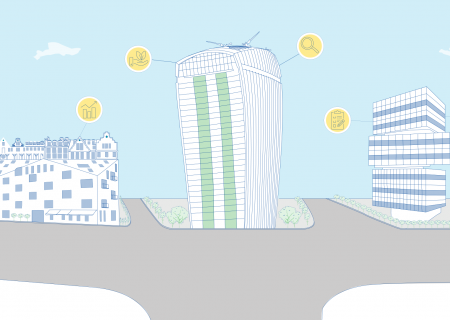Timo Löyttyniemi
Committed to the evolution of non-listed
IQ magazine recently spoke to Timo Löyttyniemi, CEO of VER, the State Pension Fund of Finland about the role of non-listed real estate in their portfolio, and also drew on his contribution to the INREV Annual Conference in a session focusing on today’s evolving institutional investment landscape.
Timo is now back at VER after a five-year assignment as Vice Chair at the Single Resolution Board in Brussels, which was created by the EU to build up a fund for supporting distressed banks in any future crisis post-GFC. He heads a team of 25 running VER’s €22bn multi-asset portfolio, which acts as a buffer fund for the payment of government employees’ pensions. VER is a long-standing member of INREV, and Timo served on the Management Board between 2007 and 2013.
‘We came to real estate rather late in the day,’ he explains, ‘starting to build up our allocation to the sector about 15 years ago. As Finnish regulations do not allow us to hold real estate directly, that has meant investing in both non-listed and listed real estates, first of all through funds of funds and later via closed-end vehicles. You could say that we were ideal INREV members as we began building our non-listed exposure soon after the organisation was founded and have always shared its aims of raising transparency and professionalism in the sector.’
As Finnish regulations do not allow us to hold real estate directly, that has meant investing in both non-listed and listed real estates, first of all through funds of funds and later via closed-end vehicles
Fast-forward to today and VER now has a 5-6% overall allocation to real estate, a level that Timo expects to be maintained for the medium-term. ‘Over the past five years our real estate returns have matched expectations at around 8% per annum, and personally I’d be happy with 6-8% in the next five,’ he says, ‘though clearly that will depend on many uncertain factors including how the business cycle and interest rates play out post-Covid. However, going forward we are analysing our approach to REITs, and given their poor performance during 2020, it’s possible we may be raising the allocation to non-listed within our real estate allocations.’
Over the past five years our real estate returns have matched expectations at around 8% per annum, and personally I’d be happy with 6-8% in the next five
VER’s expectations of lower real estate returns in future do not stem so much from a view of the potential impact of Covid-19 as from an assessment of underlying long-term trends. ‘In part this is based on the observation that the period of “good times” – when large amounts of capital investors poured into the asset class to fuel returns – has now run its course. Another factor is underlying demographics, with European populations set to age faster in the years ahead, potentially leading to a smaller workforce and lower economic growth. However, these trends are likely to affect other asset classes too, meaning that our allocation to real estate will remain largely unchanged.’
Regarding the effects of the pandemic per se on performance, Timo suggested to the INREV Conference that it was ‘difficult exactly to predict Covid’s effect on the real estate sectors, although residential looks set to perform well. Nevertheless, the impact may possibly be less than most of us think and diversification will remain key.’ Apart from this, the potential for an impetus to inflation from European governments’ Covid-related policies could ‘of itself benefit real estate via the effect on rents, but if interest rates also rise then that will hit all asset classes, offsetting the positive effect. Still, on balance VER believe that interest rates will remain low and that any higher short-term inflation is likely to be transitory.’
The impact may possibly be less than most of us think and diversification will remain key
So what does all this mean for the future role of non-listed real estate in investment portfolios? One clue was provided by a poll at the conference, when 75% of the audience thought that allocations to the asset class would rise over the next five years, while only 1% thought they would fall.
Timo agreed with this observation, though perhaps for different reasons than some other conference attendees might have given. ‘This is because non-listed real estate is still quite undeveloped for meeting the needs of pensions investors,’ he proposed. ‘It’s still hard work investing in the sector due to the legals, reporting and monitoring that need to be in place. This is particularly true for investing in closed end funds: When capital is returned it then needs to be invested elsewhere. The industrialisation of products will be hugely important going forward in making non-listed real estate more accessible – by which I mean making it more like UCITS in the mutual funds market, where investors know exactly how products will be structured.’
He also referred to Iryna Pylypchuk’s presentation of a new INREV paper on the Characteristics of Non-Listed Real Estate earlier in the conference, highlighting the need of pension funds ‘for better definition of the market and how the performance of non-listed is measured compared to the direct market. This is key to the market’s development in the long term, given the paper’s observation that the total real estate market in Europe is worth €7.5tn but the INREV index only covers €300bn.’
Clearly, Timo believes there is much work still to be done to make non-listed real estate work as well as it could do for investors, with the role of INREV no doubt centre-stage. He stressed the importance of better data not just in enhancing returns but in advancing the climate change agenda. ‘As energy efficiency in real estate is one of the key ways of tackling climate change,’ he told the conference, ‘I’m looking for better packaged information in this area. We currently lack an interface between carbon intensity and real estate performance data, and this is something we need to focus on in the years to come.’
Playback the session, ‘Relative Value: Real Estate’s role in the wider portfolio’ where Timo was part of the panel at the INREV Annual Conference 2021.







